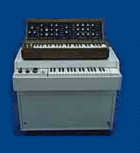






































|
Hava Narghile - Turkish Rock - 1966-1975
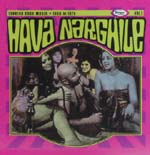
Click on the album cover to hear a sample
Comments:
Hava Narghile is a new compilation CD documenting the
psychedelic movement in Turkey between 1966-1975. About 15 different
bands are featured here, ranging from obscure one-shots to popular
hit makers. These groups were not just interested in imitating famous English
and American psychedelic groups, but rather took Western influences and
mixed them with local Turkish rhythms, Islamic melodies, and Turkish vocals(although 3 tracks are in English).
Some groups went as far as to include electric fuzz Saz, bellydancing beats, and Middle Eastern violins into their rock sound. Out of the 22 tracks included on the
CD, most of the bands range from good to excellent. But, considering that these groups
played 60s psychedelic rock, some of which bordered on progressive rock, the overall sound might sound a bit dated to some listeners. The best groups here are Mogollar and Erkin Koray. These two groups played a sophisticated, and mature style of Turkish psych that is sure to please most collectors. My only major complaint is that many of the tracks were clearly lifted from scratchy LPs. The CD booklet mentions that some of these LPs weren't even known to exist, and are very rare. However, the sound-engineer for the compilation CD could have cleaned up the scratches and pops a bit with recording software. Overall, this is a must for international-rock collectors. This compilation has some flaws, but will reward the adventurous listener.
Webpage:
Dionysus Records
Ihtiyac Molasi - Milad
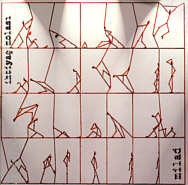
Click on the album cover to hear a sample
Comments:
Ihtiyac Molasi are an interesting modern Turkish prog band that have the potential of releasing a future classic. I'm not sure about the band's history, but they released Milad around 2000. The music, for the most part, is quite good. My main problem with Milad, though, are the vocals(more on that later). As an instrumental band, these guys kick ass. Their instrumental tracks combine Mogollar's brand of Turkish prog with rather complex symphonic prog similar to the modern Italian bands. In a prog world drowning with cliches, these musicians have some interesting melodic ideas. The band, during the instrumental sections, consists of guitar, bass, drums, piano, and violin. The guitarist likes to keep his sound clean, and his guitar style reminds me of Nekropsi. The violin player adds an ethnic element(dissonant notes, and different local scales) to the music that keeps things unpredictable. Overall, aside from the Turkish influences, these guys really remind me of some of the 80s Mexican prog bands(Delirium, etc). There is an energy, and optimism in the music that is addictive. Okay, now for the vocals. Simply put, the vocals are rather weak. Weak vocals, for some unknown reason, are quite common in progressive rock. I find it funny that prog musicians spend years trying to find virtuoso musicians(they refuse to play with Joe Average Bassist living next door because he can't play in 9/8.), spend months composing, and countless hours rehearsing yet include weak vocals on, otherwise, excellent albums. I guess this will always remain a mystery to most of us collectors, but, unfortunately, it's all too common. Anyway, the first two vocal tracks are terrible, and they even remind me of some of the 4th class jam-bands that you see in some clubs. The album actually goes from high-quality to mediocre, as the instrumental tracks merge into the vocal tracks. But, if you can overcome that fact, and we are not talking about a large amount of vocal tracks, then Milad is a good album. In the future, if these guys decide to become an instrumental band, Ihtiyac Molasi have the potential of putting out a modern prog classic. They have the compositional skills, and musical chops to do it.
Cem Karaca - Safinaz
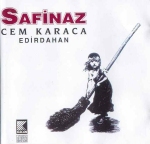
Click on the album cover to hear a sample
Comments:
Cem Karaca's 1978 release Safinaz is a gem that will impress collectors of non-Western European progressive and experimental rock. Cem Karaca started his career in the 60s, and began to release increasingly progressive works through the late-70s. Safinaz is considered by many as his most progressive album. This album features two long compositions(18 and 13-minutes long), and a shorter 4-minute track. The music combines 70s rock(horn, flute, guitar, bass, and drum-based) with Middle Eastern-sounding Turkish music, a style of Turkish music that sounds similar to Hungarian and Eastern European folk, and a touch of French theatrical prog ala Ange and Mona Lisa. Strangely, most of the music on both of the longer tracks reminds me of a less-complex Turkish version of Alusa Fallax. The combination of horns, flute, phased electric guitar probably explains that, but the way both epic tracks consist of shorter sections that weave in and out of different styles is very similar to Intorno Alla Mia Cattiva Educazione from Alusa Fallax. The new listener, though, will probably first notice the vocals. Cem's vocals remind me a bit of the vocal styles on albums by Ange and Mona Lisa, or if you will the theatrical influences and narratives of Jacques Brel mixed with strong Turkish/Eastern European influences. I'm sure that if non-English vocals are not your thing, you will have a hard time digesting Safinaz. But, fans of Middle Eastern and East European music will enjoy the vocalist. If I have to mention a weak spot on the album, I would probably warn of the amount of repetition during the first 5 minutes of the third track. This track features a chorus that is repeated about a dozen times. The narratives between the choruses adds drama and an element of unpredictability, but most listeners will be driven a little crazy by the amount of repetition(although Magma fans will have no problems here). Overall, Safinaz is a great find, but expect 30-minutes of great music. Prog labels should look into re-mixing, and adding a few quality bonus tracks to future CD reissues of Safinaz.
Year: 1978
Compositions(including some of the cheesier sections): 10/10
Vocals(in Turkish): 8/10
Recording Quality: 8/10 (Minor mixing problems, but overall I couldn't even tell if this was a 70s release or a more recent recording).
Erkin Koray - The Best of Erkin Koray

Click on the album cover to hear a sample
Comments:
I first heard of Erkin Koray after checking out the Hava Narghile compilation CD, which explored Turkey's psychedelic scene in the 1960s. Koray's track on that compilation immediately stood out with its mixture of traditional Turkish music added with a slight western influence. After reading a bit on Koray's history, I figured he was well-known in Turkey mostly for his guitar work. But, after getting a hold of this decent "Best of" CD, I have to say that Erkin was a rather excellent composer of 70s Turkish folk-pop. From a western point of view, authentic popular music from the east almost always sounds progressive. The rhythms tend to feature a lot of syncopation, odd time-signatures, and percussive instruments galore. And, the melodies are most often lavishly colorful, featuring all sorts of violins, horns, and local acoustic instruments. The music, though, is still clearly "pop-oriented", and most likely geared for local radio. Erkin Koray seemed to favor a traditional folk approach to writing his music while adding subtle hints at a western influence. Aside from the first track on this CD, which is a typical 60s blues-rock number, the rest of the tracks follow this approach. The new listener might figure that they are listening to traditional Turkish folk music. But listen closely and you will soon hear electric guitar, electric saz, bass and synths hidden in the background. The western influence is never dominant, though its subtle presence will attract collectors of international rock. While I'm not saying that this is prog, collectors of ethnic rock music will find plenty to enjoy here.
Laço Tayfa - Bergama Gaydasi
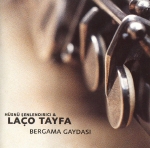
Click on the album cover to hear a sample
Comments:
I was recently introduced to the wonderful 11-piece Turkish band, Laço Tayfa. Their music, which is very hard to describe so please bare with me, isn't prog, but fans of some of the less "avant" ethnic-jazz bands on Cuneiform Records will love the sounds here. All of the compositions combine Turkish-jazz and percussion, while flirting with Eastern European folk music. The clarinet work will probably attract most listeners, although its sound will surprise those who only know the instrument from classical music and swing-jazz. Here, the clarinet plays jazzed-up local Turkish scales while freely mixing Eastern European folk melodies and themes(Romanian and Hungarian Gypsy music especially). That mixture might quickly remind many listeners of some of the Cuneiform bands, but don't expect any RIO here. Along with bass, drums, and clarinet I also hear regional percussive instruments and Turkish stringed instruments that sound similar to the dulcimer or the Hungarian Cimbalom. The dulcimer's style is similar to the way it's used in traditional Islamic classical music from Turkey, Egypt, and Iran. What really struck me about this band is the quality of their compositions. From the first track to the last, you can expect some of the catchiest melodies found in ethnic-jazz. These are the type of melodies that stick in your head days after playing the CD. The overall presentation of this group is modern, yet without any annoying "modern jazz" influence. Fans of ethno-jazz, Turkish prog, and Eastern European folk will love this CD.
Mogollar - Düm-tek
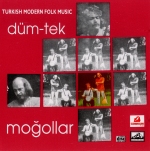
Click on the album cover to hear a sample
Comments:
Mogollar are one of the most popular Turkish rock/folk bands. The band began its career in 1967, playing standard rock popular at the time, before the musicians gained interest in mixing Anatolian folk music, and instruments, with Western influences(psychedelia, and progressive rock) to create "Anatolian rock". Their early to mid-70s LPs are of most interest to progressive rock fans. The band quit in 1976, and later reformed a few years later after getting encouragement from the local press to re-energize a then stagnant Turkish rock scene. I have to thank my friend Berk in Turkey for introducing me to a number of progressive Turkish rock bands. I became interested in the Turkish prog/psych/experimental scene after listening to a Turkish psychedelic compilation CD called Hava Narghila(reviewed in my "New Releases" section). The two bands that quickly stood out on that CD were Erkin Koray, and Mogollar, although most of the bands offered addictive Turkish psychedelia. To be honest, I'm not sure where Düm-tek falls within the Mogollar discography. The music definitely sounds like it was influenced by 70s prog rock. Turkish stringed instruments(both plucked and bowed) and percussion fit perfectly with the electric guitars, bass, drums, Rhodes piano, and Moog synths. At times, I tend to hear prog rock passages that sound similar to Iconoclasta's first album, and Goblin's Roller. The first 6 tracks of the CDs are also the most complex. The drummer quickly stands out with drum riffs similar to 70s Italian funk. We find a band mixing East/West while taking on some noticeable odd time-signatures. Although nothing reaches the complexity of the first two Gunesh albums, these guys offer a unique form of 70s folk-rock that should impress most prog fans. As the CD unfolds, the remaining track either feature colorfully mellow symphonic sounds that continue to come close to prog, or 1970s "radio-friendly" Turkish instrumental music. Overall, this is some good stuff that only represents the tip of the iceberg when it comes to Turkish progressive rock.
Compositions: 9.5/10
Vocals(minimal, and in Turkish): 9/10
Recording Quality: 10/10
Webpage:
Mogollar
Nekropsi - Mi Kubbesi
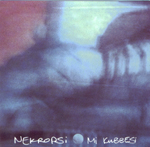
Click on the album cover to hear a sample
Comments:
Unfortunately, I recently heard that these guys are no longer playing together. But, what a great band they were. Nekropsi were part of a modern Turkish progressive music renaissance that began in the early 90s, and that is picking up steam today. Dozens of young bands, many of whom grew up on 80s metal, 70s prog/classic rock, while discovering classic local bands like Erkin Koray and Mogollar, are experimenting with adventurous forms music that mix West with East. In the case of Nekropsi, these guys invented a sound that is instantly appealing. This instrumental band features two guitarists that were clearly influenced by thrash metal guitar. But they turned off their distortion pedals, and added Turkish, and prog influences. Their sound is rhythmic, light, clear as pure water, and can turn, or soar, on a dime. At times, I'm reminded of the Fucking Champs, Dream Theater and even El Reloj. The two guitarists did an incredible job of staying away from typical metal cliches that many other bands can't seem to escape from. The drummer is also worth mentioning. His playing is light, yet fits perfectly with the metal-like sound of the band. Once in a while, though, he whips out fast drum patterns that are as frantic as the drums on Citta' Frontale's El Tor. The CD isn't entirely perfect, of course. The first 6 tracks are top-quality. We find a band full of ideas, intelligence, and energy. But, for some reason, they decided to slow things down toward the middle of the album. Their Pink Floyd influence, maybe? Things don't pick up again until the 9th track. Mi Kubbessi is also a long CD. A few tracks could have been left out, so things start to drag a bit towards the end. Overall, though, there is something for everyone. Metal fans, and guitarists will enjoy almost every track here. Prog fans who aren't really into metal will find most of the tracks appealing.
Webpage:
Nekropsi
|
